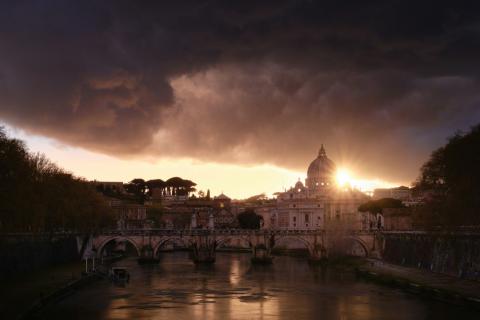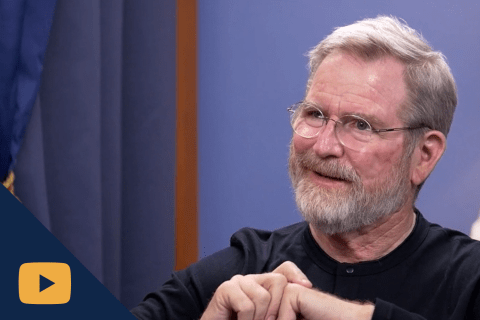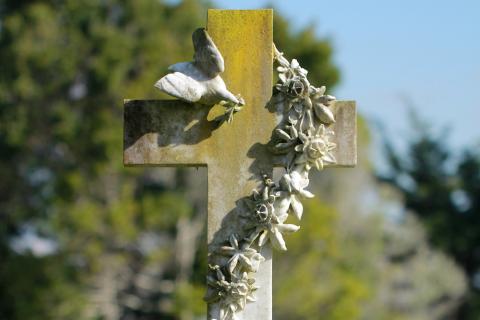
This first article in a series of three is drawn from Dr. Jonathan Reyes’ “Making the Gospel ‘Real’ in a Gnostic World,” delivered as the sixth annual Saint Hildegard Lecture hosted by the University of Mary’s Catholic Studies program.
Today I’d like to talk about evangelization and education in the context of ideological religious viewpoints, and then we’ll talk about some of the ideological religious viewpoints in our society. I’ve been working in Washington, DC, for about 10 years now, so I’ve been surrounded by ideological debates and people with pretty strong commitments. So I’ve been thinking a lot about what makes these debates and ideologies tick, and more importantly, asking how we can bring the Gospel to bear at this time.
Evangelization is the Church’s most urgent task today. In one sense, this is always true: this is what the Church does. But there is a particular urgency for evangelization today, and we can see it from the decline in church participation in the West and the related rise of unchurched generations. Some people have called it a mass apostasy. While the immigration of Catholics to the United States has temporarily slowed this decline, it’s well documented that these populations are leaving the Faith in the second or third generations. In addition to seeing large numbers of people leaving the Church, we are also seeing that many of those who still go to church no longer believe in key tenants of the Faith. We’re not just seeing a denial of controversial teachings on human sexuality, but even a denial of central theological dogmas, such as the divinity of Christ and the Real Presence. There’s a sense that something has to be done rather quickly to reverse these trends.
Contributing to this state of affairs is the secularization of Western culture. What for a time was a kind of dismissal of the Faith and a push for a tolerated but privatized Christianity is increasingly turning into a genuine hostility to Christian belief, particularly as regards those ideas that run up against the sexual revolution. This intolerance is emanating from our most important culture-forming institutions: colleges and universities, governments, global corporations, and the press and media industry.
Now, none of this is meant to be alarmist. There are different seasons in the warfare that Christ is waging for the souls of men and women, and in every moment the Gospel advances according to his plan. So we don’t evangelize based on panic, as if this were some kind of frenzied and last-ditch effort to save the Church. After all, while it’s impossible to predict what the Church and world will look like in our own lifetime, we know that demography isn’t necessarily destiny. In fact, as historian Christopher Dawson put it, “The great cultural changes and the historic revolutions that decide the fate of nations or the character of an age are the cumulative result of a number of spiritual decisions – the faith and insight, or the refusal and blindness, of individuals.” So, we take stock of the moment the Lord has given us, and we look to how Christ is moving the Gospel forward now.
But it’s also good for us to consider where we are, not just when we are: the next generation of Catholic leaders are going to come from Catholic universities such as this. On a deeper level, evangelization has always been a part of education, including higher education. This isn’t necessarily obvious. In 1949, Christopher Dawson argued: “From the beginning Christian education was conceived not so much as learning a lesson but as introduction into a new life, or still more as an initiation into a mystery.” “Christian education,” he continued, “was not only an initiation into the Christian community, it was also an initiation into Another World; the unveiling of spiritual realities of which the natural man was unaware and which changed the meaning of existence.” A university does more than this, of course, but evangelization is a major component in any genuine Catholic educational enterprise. Wherever we are touching the truths of God, there is the impetus to step into those truths – to take them not simply as propositions but to come to believe them. This is what St. Paul means when he calls for a conversion of mind. For education, this means that the Faith is treated not simply as an interesting subject matter for study, like the Constitution, but as a concrete truth and a living person.
In many places, we’ve lost that sense of education. There are many reasons why we’ve lost it, but it’s something we need to recover. At certain Catholic colleges and universities, we’ve seen a model of education that relegates the living, concrete reality of Faith to something like a campus ministry department, treating it as a voluntary “extra” that might just as well exist outside the institution itself. In these cases, the sacraments and a handful of other Catholic opportunities are available to students, but the Faith isn’t really engaged in the intellectual project of the university. This is all problematic: it’s not sufficient for the intellectual integration of faith.
The corrective to these problems is not to insist that we talk about Jesus ten times in every class period, or turn our teaching into preaching, or only teach theology and spirituality. The question for Catholic institutions is how we can grant the Faith in the disciplines in such a way that protects the integrity of the disciplines as well as the integrity of the Faith, and how we can create a philosophic habit of mind. So we can see how the question of the integration of the Faith in the educational project is connected to the question of evangelization.
There’s another reason that the university is particularly important for the project of evangelization, which I’m stealing from Alasdair MacIntyre. MacIntyre identified universities and colleges as being among the primary places where the battle between the Christian and non-Christian visions of the world are fought. It is here that the contests between the Christian Faith and the non-Christian ideologies of the day – which often function as religions – are engaged. A proper reckoning with the secular religions of the day requires sustained intellectual work, and universities are almost alone among Catholic institutions in having the time and the skill necessary to do this work well. I must emphasize that this is much more than an apologetic task. Apologetics is important, but a genuine reckoning with modern ideology requires developing positive ways of presenting the Gospel that take into account the needs and aspirations that otherwise drive these other ideologies. We have to understand what these ideologies are going after. And it’s not just enough to say that there are certain problems with them: we have to propose an answer – a better account. This is the great task. This re-articulation of the Gospel in the face of counter-religions has a powerful effect in shaping Catholic culture.
Here I’m going to steal a lengthy quote from Alasdair MacIntyre again, from a great talk he gave entitled “Catholic Instead of What?”:
Catholic Christians believe that God exists, that the Word was made flesh, that the bread and wine of the Eucharist become Christ's body and blood, that the pope and the bishops teach with apostolic authority. But Catholic Christians also disbelieve, and in each particular time and place, they deny just those secular doctrines, theories, and attitudes that then and there are taken to provide grounds for rejecting the truths of the Catholic faith. To be a reflective Catholic is always to be a Catholic rather than something else. So, Augustine was a Catholic rather than a Manichean or a Neoplatonist; Pascal was a Catholic rather than a skeptic or a Cartesian; Maritain was a Catholic rather than a materialist or a Bergsonian… [Since] the alternative and rival forms of belief with which Catholics need to engage vary from age to age, and so therefore do the quarrels which Catholics have with such beliefs. It follows that the beliefs of reflective Catholics also vary, and that the Catholic culture that emerges from the quarrel with one such set of alternative and rival forms of belief may be very different from that which emerges in other contexts. There have been, and are, Catholic cultures, not Catholic culture.
Catholic universities can then provide the kind of deep and thoughtful disagreement with modern ideological religions, for which will arise not just good critiques of those ideologies, but also positive articulations of the faith. These will be philosophical, poetical, narrative, works of visual art and music, and will even impact the practical sciences. When these cultural creations are integrated with concrete communal forms and practices of the faith, a new Catholic culture will arise, one that is suited for the times in which we live.
The university is meant to be more than a group of similarly-aged individuals who happen to share living quarters, like to hang out on the weekends, and attend a variety of often unrelated classes on weekdays. The Catholic university, under the leadership of its professors and administrators, is meant to provide an integrated life for students, one in which intellectual formation, moral formation, and the rhythm of the day and the social and religious practices of the community support and sustain one another.
Dr. Reyes’ remarks continue with an investigation of the prevailing modern Gnostic imaginative visions in “The Gnostic Ideologies of the Modern Age.”

Next: The Gnostic Ideologies of the Modern Age
Many people in the West have accepted one of two modern narrative visions of the world: the techno-nationalist vision and the equity-justice vision. What do these visions have to say about human life?


